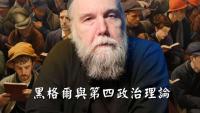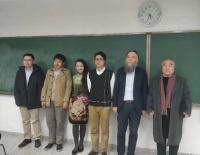4pt
个多极化世界形成的基础是承认各种文明和文化的平等
多極世界線上會議
4月29日的多极化理论国际会议。
京师亚欧名家讲坛第四讲 | 亚历山大·杜金:“多极世界的地缘政治:被划分的心脏地带与中国作用”
2019年7月4日,由教育部区域与国别研究基地北京师范大学俄罗斯研究中心、中国俄罗斯东欧中亚学会与中国社会科学院“一带一路”研究中心联合主办的“京师亚欧名家讲坛”举办了第四讲。本期讲坛邀请了俄罗斯著名思想家、政治分析家亚历山大·杜金教授,讲座主题为“多极世界的地缘政治:被划分的心脏地带与中国作用”。俄罗斯研究中心专家、哲学学院张百春教授担任本次讲座的主持人,俄罗斯研究中心主任刘娟教授、俄罗斯研究中心专家及俄文系师生们参加了本次讲座。
杜金教授是俄罗斯重量级地缘政治学者,被称作俄罗斯总统的“大脑”,他的学术思想有着很大的影响力。讲座中,他带领中心师生一起进行了一次“头脑风暴”。
讲座上,亚历山大·杜金教授为大家梳理了“地缘政治”这一概念产生的历史渊源、地位与发展、转化历程,在多极世界的背景下,他阐释区分了“陆地力量(心脏地带)”和“海洋力量”等概念,并划分了其各自的具体范畴。
三种俄罗斯知识分子
这些论调在今天听起来并不新鲜,我甚至想起了2013年在爱沙尼亚的塔尔图,听一位从古拉格归来的政治犯讲起的笑话。作为前苏联的少数民族,这位爱沙尼亚人非常不喜欢俄罗斯的沙文主义:话说犹太人、爱沙尼亚人和俄罗斯人都进了地狱,地狱里有许多滚开的巨大的锅子,犹太人的锅得盖好盖子,不然他们就会抱团逃走;爱沙尼亚人的锅无需盖子,只要有人想爬出去,就会被锅里其他人拽着不放;俄罗斯人的锅呢,哦,俄罗斯人,他们看到那口锅如此之巨大,已经忍不住主动要往里面爬了。
但在二十年前的 1997 年,当杜金出版《地缘政治基础》(The Foundation of Geopolitics)一书时,俄罗斯正因为经济崩溃、车臣军事行动的失败以及北约计划东扩,处在一个自尊心极度受挫的时期,杜金的“欧亚主义”,“根植于伟大的俄罗斯帝国传统的主权、价值和信仰”,混合了东正教、神秘学、占卜术、法西斯主义、后现代主义和文化理论,终于在后苏联的社会土壤里开出花来。《地缘政治基础》出版后洛阳纸贵,各大书店纷纷开设地缘政治专柜,俄罗斯杜马甚至成立了“地缘政治委员会”,用杜金自己的话说,他的理论“就像一个病毒,我写下了这个程序,然后它就自己复制,蔓延开来”。
欧亚主义回归与全球革命: 亚历山大·杜金的地缘政治观
上世纪苏联解体之后,世界秩序进入“美国时刻”,美国主导的全球化进程最终演变为美国缔造的“自由世界秩序”。由于找不到意识形态方面的可替代物,俄罗斯等国在“历史终结论“的普世论调下开始按照美国秩序—自由市场、政治民主、个人自由进行转型,由此导致的代价则是市场和政治的寡头化以及社会分裂。与此同时,由欧美主导的北约和欧盟体系开始不断东扩,试图在经济、安全和文化各层面吸纳前苏联各加盟国,由此不断强加俄罗斯的安全困境,并最终促成俄罗斯与美欧在乌克兰问题上的彻底摊牌。与此同时,在共产主义作为一种意识形态已经随着苏联的解体而破产的情况下,如何在思想形态上应对美欧的自由主义理论,也一直成为俄国思想家探讨的话题。正是这种问题意识,导致新欧亚主义泛起,它植根于俄罗斯19世纪以来应对“西方”现代性挑战的生存意志,并最终演变为亚历山大 杜金的“新欧亚主义”。通过继承俄罗斯本土发展的欧亚主义传统、整合包括欧洲“传统主义”在内的各种左、右翼思想资源,并加入地缘政治思想,杜金逐步发展起一个反抗美国秩序的新理论旗帜,其核心在于发展欧亚大陆的联盟/轴心体系,并在此基础上解决欧亚地缘的安全困境,最终实现一个“诸帝国体系”,杜金将其核心概括为国家主权、社会正义和传统宗教。
杜金之被关注,源于2014年以来的乌克兰危机。彼时,美国《外交事务》杂志网站发文称其是普京的“大脑”。由此反映出欧美媒体和政界对俄罗斯的认知正在经历一个转变。如果我们保持类似普京式的警觉,也可以视其为欧美宣传战略的冰山一角。无独有偶,在包括中国国家主席习近平和俄罗斯总统普京齐聚纽约庆祝联合国成立70周年大会之际,《外交事务》网站又发文《普京的哲学家》,进一步揭露出普京统治的意识形态来源Ivan Ilyin。他们试图传达何种信息?读者可以自行揣测。而无论基于何种立场来思考包括诸如杜金和Ivan Ilyin在内的俄国思想家,也必然是仁者见仁、智者见智。更重要的是,观察和思考这些思想家,是要对形成中国对国际秩序的认知有所借鉴,在这方面,中国与俄国分享相似经历,但又走上不同发展历程,这也部分是不同的地缘处境和战略机遇所致,这要求我们实事求是,基于自己的国家利益发展自己的世界观和国际战略。
COUNTER-HEGEMONY IN THE THEORY OF THE MULTIPOLAR WORLD
Although the concept of hegemony in Critical Theory is based on Antonio Gramsci’s theory, it is necessary to distinguish this concept’s position on Gramscianism and neo-Gramscianism from how it is understood in the realist and neo-realist schools of IR.
The classical realists use the term “hegemony” in a relative sense and understand it as the “actual and substantial superiority of the potential power of any state over the potential of another one, often neighboring countries.” Hegemony might be understood as a regional phenomenon, as the determination of whether one or another political entity is considered a “hegemon” depends on scale. Thucydides introduced the term itself when he spoke of Athens and Sparta as the hegemons of the Peloponnesian War, and classical realism employs this term in the same way to this day. Such an understanding of hegemony can be described as “strategic” or “relative.”
In neo-realism, “hegemony” is understood in a global (structural) context. The main difference from classical realism lies in that “hegemony” cannot be regarded as a regional phenomenon. It is always a global one. The neorealism of K. Waltz, for example, insists that the balance of two hegemons (in a bipolar world) is the optimal structure of power balance on a world scale[ii]. R. Gilpin believes that hegemony can be combined only with unipolarity, i.e., it is possible for only a single hegemon to exist, this function today being played by the USA.
In both cases, the realists comprehend hegemony as a means of potential correlation between the potentials of different state powers.
Gramsci's understanding of hegemony is completely different and finds itself in a completely opposite theoretical field. To avoid the misuse of this term in IR, and especially in the TMW, it is necessary to pay attention to Gramsci’s political theory, the context of which is regarded as a major priority in Critical Theory and TMW. Moreover, such an analysis will allows us to more clearly see the conceptual gap between Critical Theory and TMW.
第四政治理论:生存还是灭亡?
一贯坚持政治最小化原则的自由主义在取得全面胜利后决定完全取消政治。自由主义不允许建立另外的政治制度,以求实现永久统治,或是由于缺乏卡尔 史密特说的对于构建政治地位所需的敌人,因而全面解决政治议程是可能的。在任何情况下,自由主义都想颠覆政治。同时,他自身发生了改变,从思想政治纲领和宣言的层次转变为实物层次,进入自由主义的,但是非政治的,一般的,“自然的”形式的社会现实。由于这种历史变化,在最近的几百年里彼此激烈仇视的的政治思想失去了自己的现实性。保守主义,法西斯主义和共产主义,甚至他们的分支都失败了,而胜利的自由主义迅速转变为生活,消费方式,个人主义和碎片化的亚政治存在的后现代主义风格。政治成为生命政治,转化到个人和亚个人的层次上。从舞台上消失的不仅是失败的政治思想,而且包括自由主义在内的政治思想。因此替代选择的形成过程停滞不前。那些不赞同自由主义的人处于这种复杂的环境下,曾经战胜的敌人消融消失了,斗争随风而逝,不复存在。那么在没有政治的时候如何从事政治呢?
全球革命聯盟
我們生活在年底的歷史循環。所有進程構成了流動的歷史邏輯僵局。
第四個政治理論 這個概念的誕生,
結束的20世紀現代性的終結











